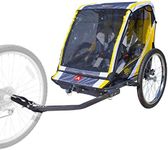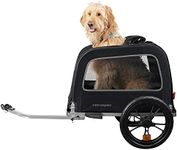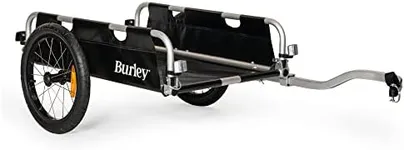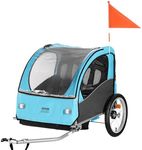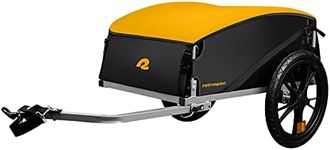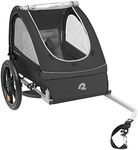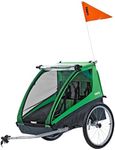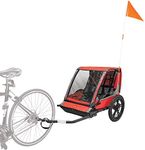Buying Guide for the Best Foldable Bike Trailer
Choosing a foldable bike trailer can make your cycling experience much more versatile, whether you want to carry groceries, luggage, or even your kids or pets. The key is to find a trailer that matches your needs in terms of capacity, ease of use, and safety. Before making a decision, think about what you plan to transport, how often you'll use the trailer, and how much space you have for storage when it's not in use. Understanding the main features will help you pick a trailer that fits seamlessly into your lifestyle.Weight CapacityWeight capacity refers to the maximum load the trailer can safely carry. This is important because overloading a trailer can make riding unsafe and may damage the trailer or your bike. Trailers typically range from carrying around 40 kg (for lightweight models) up to 100 kg or more (for heavy-duty options). If you plan to carry just a few groceries or a small pet, a lower capacity is fine. For larger loads, like multiple bags or heavier cargo, look for a higher weight limit. Always consider what you’ll carry most often and choose a trailer that can handle a bit more than your usual load for flexibility.
Foldability and Storage SizeFoldability describes how easily the trailer can be collapsed for storage or transport. This is crucial if you have limited space at home or need to fit the trailer in your car. Some trailers fold flat with quick-release mechanisms, while others may require more effort or tools. Compact folding is ideal for apartment dwellers or those who travel frequently. If you have plenty of storage space, a less compact model may be acceptable. Think about where you’ll store the trailer and how often you’ll need to fold it up.
Hitch Attachment TypeThe hitch attachment is the part that connects the trailer to your bike. It’s important because it affects stability, ease of installation, and compatibility with your bike. There are universal hitches that fit most bikes, and specific ones designed for certain frame types or wheel sizes. Some hitches are tool-free and quick to attach, while others may be more secure but require more effort. If you plan to switch the trailer between bikes or remove it often, look for a simple, universal hitch. If you want maximum stability, a more robust attachment may be better.
Wheel Size and TypeWheel size affects how smoothly the trailer rolls and how well it handles bumps or rough terrain. Smaller wheels (12-16 inches) are lighter and make the trailer more compact, but may struggle on uneven surfaces. Larger wheels (20 inches or more) offer better stability and comfort, especially on longer rides or rough roads. If you’ll mostly use the trailer on city streets, smaller wheels are fine. For mixed terrain or longer trips, larger wheels are a better choice.
Weather ProtectionWeather protection refers to features like covers, canopies, or waterproof materials that shield your cargo from rain, sun, or wind. This is important if you plan to use the trailer in all kinds of weather or want to protect sensitive items. Some trailers come with full covers, while others offer optional add-ons. If you’ll be out in unpredictable weather or carrying items that need to stay dry, prioritize good weather protection. For fair-weather use, this may be less critical.
Safety FeaturesSafety features include reflectors, flags, lights, and sturdy construction. These are important for making sure you and your trailer are visible to others, especially in low light or busy areas. Some trailers come with built-in reflectors or mounts for lights, and a bright safety flag is often included. If you’ll be riding in traffic or at night, look for trailers with strong visibility features. For daytime or off-road use, basic reflectors may be enough.


